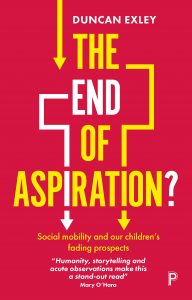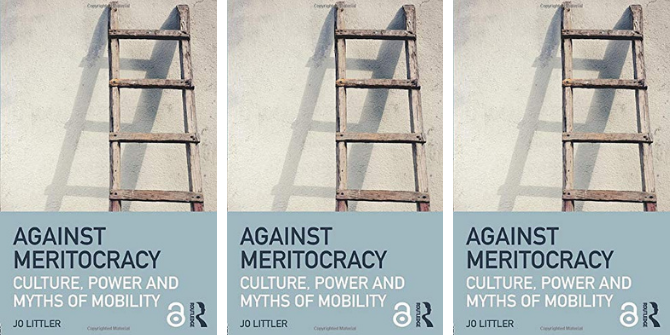In The End of Aspiration?, Duncan Exley reflects on the current social mobility crisis facing the UK and the ways that this can be addressed across government, business and the third sector. The book offers an accessible reality check of the state of social mobility in the UK, writes Ross Goldstone, and is a fruitful addition to the rapidly developing literature problematising intensifying social and economic inequality in the UK.
The End of Aspiration? Social Mobility and our Children’s Fading Prospects. Duncan Exley. Policy Press. 2019.
 In The End of Aspiration?, Duncan Exley reflects on the current social mobility crisis facing the UK and the ways this can be addressed across government, business and the third sector. The self-declared focus of the book is on how we can work towards a future that increases ‘the chances we, or our children, have of attaining the aspirations that most of us hold, and of living a life determined more by our effort and choices than by our background’ (227).
In The End of Aspiration?, Duncan Exley reflects on the current social mobility crisis facing the UK and the ways this can be addressed across government, business and the third sector. The self-declared focus of the book is on how we can work towards a future that increases ‘the chances we, or our children, have of attaining the aspirations that most of us hold, and of living a life determined more by our effort and choices than by our background’ (227).
The End of Aspiration? offers an accessible reality check of the current state of social mobility in the UK, with initial chapters focusing on the plethora of evidence showing the issues regarding low social mobility. Furthermore, the book’s ability to oscillate between a range of evidence from academic research and its own primary case studies of the experiences of social mobility breathes life into the abundant, yet sometimes inaccessible, story depicted in such research. The primary case studies drawn upon come from the public, private and third sectors, and include an actor, a politician, a billionaire entrepreneur and a surgeon. Thus, Exley illustrates how the barriers and opportunities associated with class, or socio-economic background, that inhibit social mobility exist across society.
The book’s focus on social mobility, its solicitation of academic evidence and its experiential grounding mean it is both accessible and relevant to multiple audiences, including academics across several disciplines, researchers in the third sector concerned with issues of social justice and those in government looking to deliver upon the desires and aspirations that Exley views as common to all in society – ‘a job that is rewarding (in all senses of the word), a home to call one’s own, family, and […] security, respect, belonging’ (259). In doing so, it connects to other recent contributions critically exploring issues of social mobility and opportunity, such as Social Mobility and its Enemies by Lee Elliot Major and Stephen Machin and The Class Ceiling by Sam Friedman and Daniel Laurison.

The book begins with a critical exploration of ‘how far the UK is from being an opportunity society’, wherein a range of evidence is presented to depict the ‘story’ of social mobility from the twentieth century to today. After finishing Chapter One with a discussion of the case studies Exley uses to enunciate points made throughout the book, Chapter Two begins four consecutive chapters that explore the ways in which family background and privilege (or lack of it) come to shape an individual’s educational career: Chapter Two focuses on Early Years; Chapter Three on School Years; Chapter Four on the transition from secondary to post-secondary and tertiary education; and Chapter Five explores the expanding and segmented Higher Education (HE) sector.
In Chapter Five, Exley shows that ‘if the children of lower-income families make it to university, or if the children of middle-income families make it to elite universities, they usually graduate with better grades than their more-privileged classmates’ (162). However, Chapters Six and Seven detail the better labour market outcomes enjoyed by more privileged individuals in society, in terms of access to lucrative employment opportunities and career progression.
Chapter Eight touches upon the experiences of being socially mobile, such as ‘never ever truly belong[ing] to the tribe’ (185) in one’s new social and occupational environment. The chapter also discusses the ways in which wealth and privilege reproduce themselves and are ‘stacked against’ middle- and low-income groups (199): for example, via the use of inherited wealth to purchase property in an increasingly expensive housing market or marrying within one’s socio-economic background.
Before offering concluding remarks and opportunities for reform, Exley answers the question, ‘Does social mobility matter?’ During this chapter, arguments against the notion of social climbing are critically engaged with, including its tension with achieving social justice and arguments that juxtapose this with collective improvement.
In ending the book, Exley highlights the fundamental characteristics of British society that pose barriers to social mobility and posits a number of ideas that can help to promote it. These recommendations draw from different areas of government policy, from creating a stronger social security system that can enable the pursuit of aspirations to introducing a living wage across the UK, abolishing selective education and removing the subsidies provided to independent schools and implementing a system of contextualised offers in university entry procedures. All of these form part of a wider vision Exley advocates which removes hinderances, or ‘toll booths’, to social mobility and ensures individuals have access to a bigger piece of the pie, in terms of economic (e.g. jobs) and non-economic (e.g. housing) resources, to supply the young people of today with opportunity.
Above all, Exley calls for a new political narrative at the national level that at its heart provides rewarding and respected employment, quality and secure housing and lifelong security which is based on merit rather than privilege. However, while he states that this will not ‘be made easier by the inevitable resistance of those who fear the loss of their advantages if others are allowed to compete more fairly’ (258), it is unclear how a new aspirational, national vision can be created ‘regardless of our class’ when such vehement opposition to a more egalitarian society exists. Moreover, while Exley calls for a vision which dispels the division between ‘collective wellbeing and individual flourishing’ (260), this seems to face strong resistance from a discourse of individualism intensifying in UK society today.
Nonetheless, The End of Aspiration? is a fruitful addition to the rapidly developing literature problematising intensifying social and economic inequality and stagnant social mobility in the UK. By touching on a number of interrelated and pertinent issues to social mobility prevalent in the sociology of education, the book will be a fascinating read for academic and non-academic enthusiasts alike, whether coming from research, practice or policy backgrounds. At its core, the book points to an emergent crisis, already taking hold, concerning a growing sense of inequality and unfairness, prompting disengagement, disenchantment and a loss of hope amongst a growing section of UK society. Without confronting this, Exley believes we all collectively lose, but with the harshest consequences faced by the most disadvantaged.
Note: This review gives the views of the author, and not the position of the LSE Review of Books blog, or of the London School of Economics.
Image Credit: Photo by Susan Yin on Unsplash.







